Divorce Guidance
Attempted Rape Charges: Key Facts
Perplexed about attempted rape charges? Read on to uncover pivotal insights into proving intent and navigating the legal process.

In attempted rape cases, proving the intent to penetrate without consent is essential for charges. Actions must show more than preparation and penetration isn't necessary for conviction. The process involves evaluating evidence for realistic conviction prospects. Guidelines shape prosecution decisions, focusing on evidence and fairness. Only about 44.7% of suspects faced charges in 2019-20, prioritizing strong cases. Charging decisions consider intent, victim statements, and evidence strength. Legal advocacy supports victims through the complex legal system, aiming for a just resolution. Understanding these key facts sheds light on the legal intricacies and pursuit of justice in such cases.
Key Takeaways
- Attempted rape is defined as trying to penetrate someone without consent.
- Prosecution requires proving intent to penetrate without consent.
- Prosecutorial decisions based on evidence and intent.
- Code for Crown Prosecutors guidelines shape prosecution in the UK.
- Factors influencing charging decisions include evidence, victim statements, and case strength.
Legal Definition of Attempted Rape
In the legal domain, attempted rape is defined as the unsuccessful attempt to commit rape by trying to penetrate someone without their consent. This means that even if the act of penetration isn't successful, the pivotal and action leading up to it can still be considered a serious offense.
Legally, attempted rape is treated similarly to completed rape under the Criminal Attempts Act 1981. To prosecute a case of attempted rape, the prosecution must prove the intent to penetrate without consent, which can be inferred from the evidence presented. It's vital that the actions taken go beyond mere preparatory steps and clearly demonstrate a concrete intention to commit the offense.
Importantly, actual penetration isn't necessary for a conviction of attempted rape, highlighting the significance of the perpetrator's intentions and actions in such cases.
Prosecutorial Process for Attempted Rape
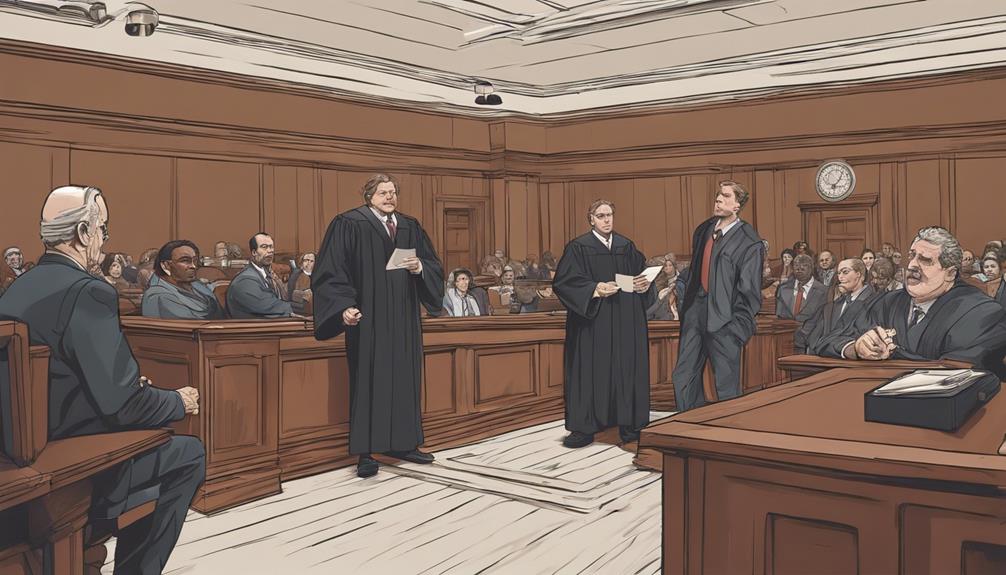
The prosecutorial process for attempted rape involves the evaluation of evidence by the Crown Prosecution Service (CPS) and specialized Rape and Serious Sexual Offenses (RASSO) units. These trained prosecutors make decisions on charging suspects based on the realistic prospects of conviction and available evidence.
The process emphasizes impartiality and evidence-based decisions to seek justice for victims.
Legal Elements Required
When prosecuting attempted rape cases, establishing the defendant's intent to penetrate without consent is an essential element. This intent must be clear and beyond mere preparation, demonstrating a definite effort to commit the offense.
In cases of attempted rape, the prosecution relies heavily on proving the defendant's intent through their actions and the surrounding circumstances. Evidence of this intent is vital for a successful legal case. The process for prosecuting attempted rape follows similar legal standards as completed rape cases, highlighting the importance of proving the defendant's intent to commit the act.
Burden of Proof
Typically, prosecutors bear the responsibility of demonstrating the accused's intent and actions in attempting to commit rape in cases of attempted rape. To secure a conviction, the prosecution must prove beyond a reasonable doubt that the individual intended to penetrate without consent.
The prosecution must show that the accused's actions moved beyond mere preparation and substantially towards the completion of the offense. While direct evidence is preferred, intent can also be inferred from the circumstances and the accused's behavior.
Importantly, a physical attempt at penetration isn't always necessary for a conviction of attempted rape. Hence, the burden of proof lies with the prosecution to establish both the intent and actions of the accused in the attempted commission of rape.
Code for Crown Prosecutors Guidelines
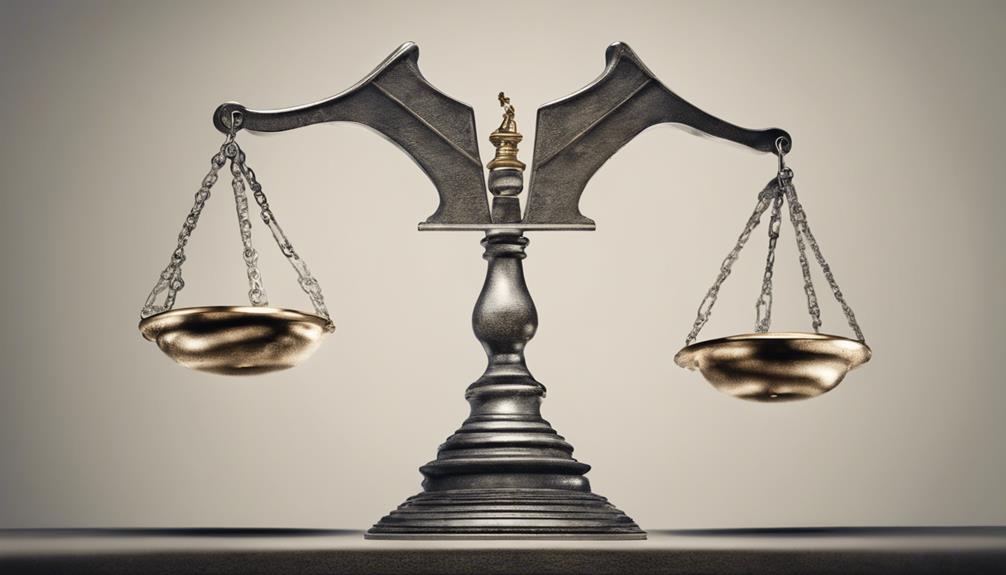
Guidelines outlined in the Code for Crown Prosecutors play an essential role in shaping the prosecution of rape cases in the UK. Prosecutors adhere to these guidelines to make sure that their decisions are impartial and based on evidence.
Specifically, the Rape and Serious Sexual Offences (RASSO) units, which consist of experienced lawyers, handle rape cases in accordance with the Code. To further enhance their capabilities, prosecutors undergo thorough training specifically focused on handling rape cases effectively.
One critical aspect highlighted in the guidelines is that decisions regarding charging suspects are made after a thorough assessment of the realistic prospects of conviction. This ensures that cases proceed based on a strong foundation of evidence and legal principles.
Prosecution Rates and Convictions
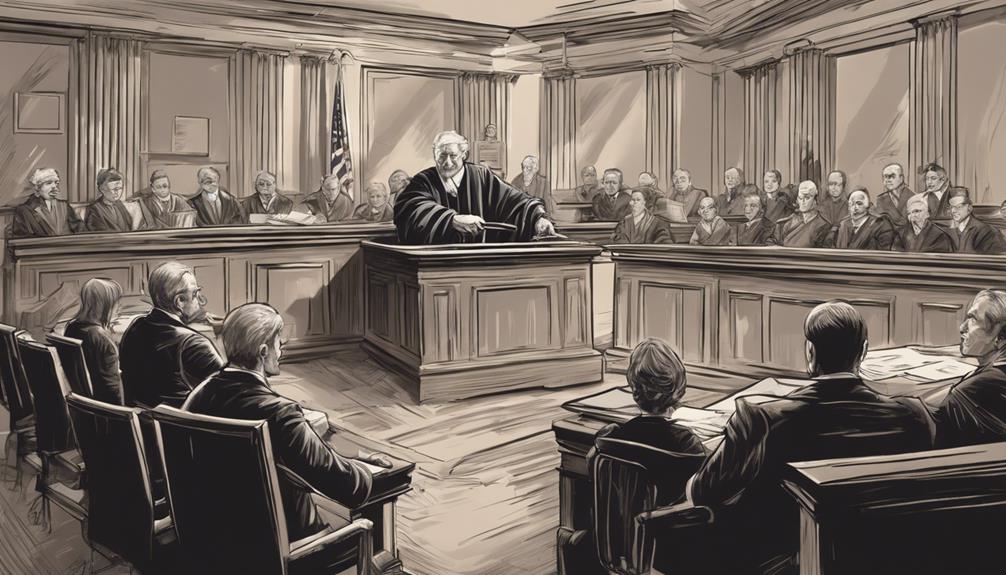
After following the guidelines outlined in the Code for Crown Prosecutors, prosecutors focus on achieving high prosecution rates and convictions in rape cases, ensuring accountability and justice for victims. Here are key points related to prosecution rates and convictions in rape cases:
- **44.7% of suspects in rape cases were charged by the CPS in 2019-20, demonstrating a commitment to pursuing legal action against perpetrators.
- Prosecutors aim to bring charges with a thorough prospect of conviction in rape cases, prioritizing cases where there's compelling evidence to support the allegations.
- RASSO units, staffed with seasoned lawyers, handle rape cases within the CPS, ensuring specialized attention to these sensitive cases.
- Prosecutors undergo extensive training in handling rape cases impartially and based on evidence, emphasizing the importance of fair and just legal proceedings in such cases.
These efforts underscore the dedication of prosecutors to uphold justice and hold offenders accountable in cases of attempted rape.
Factors Influencing Charging Decisions

Factors influencing charging decisions for attempted rape cases encompass a range of critical considerations, including evidence of intent, preparatory actions, and victim statements. Prosecutors carefully evaluate the suspect's history, their relationship with the victim, and any previous incidents.
Additionally, the presence of witnesses, physical evidence, and forensic analysis greatly impact the likelihood of a successful prosecution. Victim credibility, the consistency of statements, and their willingness to testify are also vital factors in determining whether to press charges for attempted rape.
Furthermore, the strength of the case, such as corroboration of events and details, plays a pivotal role in the decision-making process. By weighing these elements meticulously, prosecutors aim to guarantee that charging decisions in attempted rape cases are based on a thorough assessment of the available evidence and the circumstances surrounding the alleged crime.
Impact on Victims and Justice System
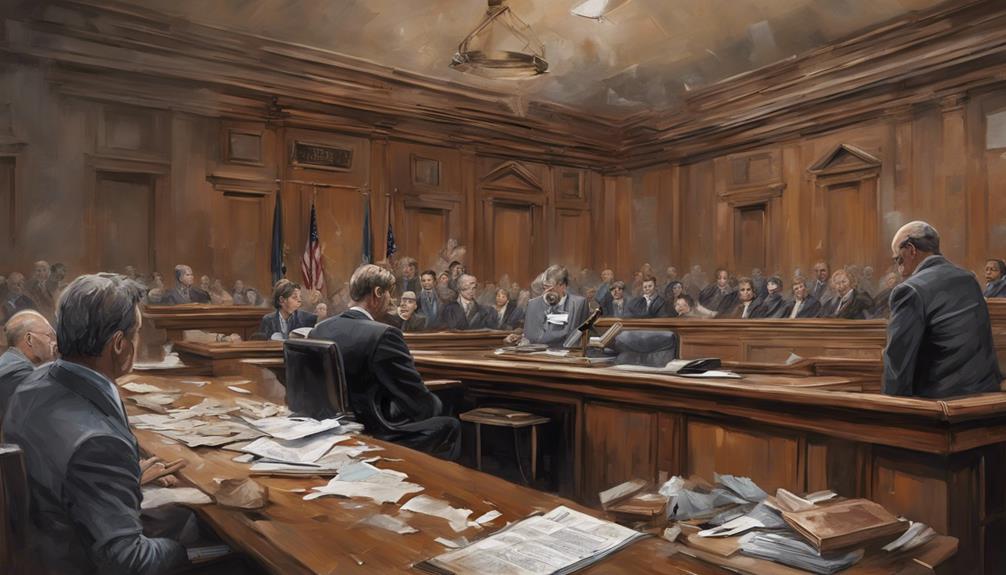
Victims of attempted rape may experience lasting psychological and emotional distress, similar to those who've been fully assaulted.
The justice system treats attempted rape cases as seriously as completed ones, aiming to hold offenders accountable.
However, proving intent in attempted rape cases can be challenging, necessitating support services for victims to navigate the legal process effectively.
Victim Support Services
Victim support services play a pivotal role in providing emotional, practical, and legal assistance to individuals impacted by attempted rape, aiming to empower survivors and facilitate their journey through the criminal justice system. These services are essential for survivors of attempted rape because they provide a range of support mechanisms. Here are some key aspects of victim support services:
- Empowerment: Support services aim to empower victims, helping them regain a sense of control and autonomy.
- Guiding: They assist survivors in navigating the complex criminal justice system, making sure they understand their rights and options.
- Counseling and Advocacy: Victim support services offer counseling and advocacy to address trauma and promote healing.
- Collaboration: These organizations work closely with law enforcement, prosecutors, and healthcare professionals to guarantee comprehensive care for victims.
Legal Process Challenges
Handling the legal process in cases of attempted rape poses significant challenges for both survivors and the justice system. Proving intent and consent can be complex, leading to emotional distress and re-traumatization for victims.
The justice system may struggle with evidentiary requirements, victim credibility assessments, and balancing the rights of the accused. Delayed reporting of incidents can impact evidence collection and witness testimony, affecting prosecution.
Support services such as counseling and legal advocacy play a vital role in addressing these challenges. Overall, the legal process in attempted rape cases requires careful consideration of the victim's well-being, the pursuit of justice, and the complexities of the legal system to ensure a fair and just outcome for all parties involved.
Frequently Asked Questions
Can a Person Be Charged With Attempted Rape if the Victim Did Not Physically Resist the Attacker?
Yes, a person can be charged with attempted rape even if the victim did not physically resist the attacker. Attempted rape charges can be based on the intent to commit the act, regardless of the victim's physical response.
How Do Prosecutors Determine Whether to Charge Someone With Attempted Rape or a Lesser Offense?
Prosecutors meticulously weigh evidence, witness statements, and intent to determine whether to charge with attempted rape or a lesser offense. Their decision-making process combines legal expertise and ethical considerations, aiming for justice.
Are There Any Specific Defenses That Can Be Used in Cases of Attempted Rape Charges?
In cases of attempted rape charges, specific defenses may include lack of intent, consent, mistaken identity, or alibi. These defenses can be utilized to challenge the prosecution's case and potentially lead to a favorable outcome for the defendant.
How Do Prosecutors Handle Cases Where the Victim's Testimony Is the Main Evidence Against the Accused?
When the victim's testimony is the primary evidence against the accused, prosecutors diligently gather corroborating evidence and witness testimonies to bolster the case. They aim to present a compelling and thorough argument in court.
What Resources Are Available to Support Victims of Attempted Rape Throughout the Legal Process?
Victims of attempted rape can access resources like victim advocates, counseling services, and legal assistance. These resources provide support and guidance throughout the legal process, ensuring victims have the help they need during a challenging time.
Conclusion
In summary, the prosecution of attempted rape cases involves a complex legal process with various factors influencing charging decisions. While the Code for Crown Prosecutors provides guidelines, prosecution rates and convictions can vary.
Victims of attempted rape face significant challenges in seeking justice, highlighting the importance of a thorough investigation and fair legal proceedings. Understanding the key facts surrounding attempted rape charges is vital for promoting accountability and ensuring the protection of individuals from sexual violence.
Maya brings a wealth of experience in providing emotional support to individuals facing life’s challenges. Her contributions to How Get Divorce are characterized by empathy, understanding, and a profound sense of authority on matters of emotional well-being. Maya’s work is dedicated to ensuring that our community feels supported and understood, offering tools and advice to cope with the emotional aspects of divorce.
Divorce Guidance
What You Need to Know About DuPages Restricted Cases
Familiarize yourself with DuPage's restricted cases to navigate legal complexities – discover how confidentiality rules impact case access.
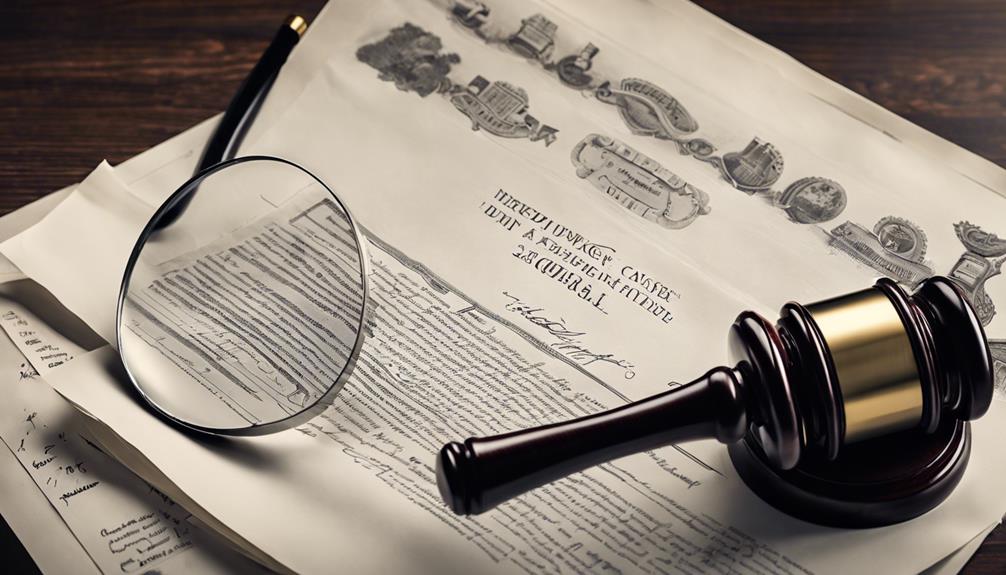
Understanding DuPage's restricted cases is essential for legal navigation. Inactive, impounded, sealed, or expunged cases limit access. Juvenile cases have added privacy safeguards. Legal factors and nature of information determine restrictions. Breaching can lead to legal repercussions due to confidentiality concerns. Modifications require court approval under specific conditions. Seeking legal help is critical for proper authorization. Encore their knowledge with further insights into DuPage's complex legal landscape.
Key Takeaways
- DuPage's restricted cases include sealed, expunged, and impounded cases.
- Unauthorized access can have legal repercussions due to confidentiality concerns.
- Modifications in restricted cases require court approval and valid justifications.
- Access to restricted cases requires authorization from the court.
- Seeking legal help from experienced attorneys is crucial for handling restricted cases properly.
Legal Definition of Restricted Cases
Defining restricted cases in the DuPage County Circuit Court involves categorizing cases as inactive, impounded, sealed, or expunged to safeguard sensitive information and maintain confidentiality. Inactive cases are those on hold or without recent activity.
Impounded cases are sealed by court order, often involving sensitive details. Sealed cases are inaccessible to the public, preserving privacy. Expunged cases are those erased from records, typically after meeting certain criteria. These measures guarantee that confidential information remains protected and out of public view.
Cases involving juvenile defendants receive additional privacy safeguards to shield their identities and proceedings from the public eye. Access to restricted cases is strictly controlled, limited to authorized personnel to prevent unauthorized dissemination of information.
The Clerk's office meticulously reviews requests for access to these cases to uphold privacy laws and maintain the integrity of the restricted case system in DuPage County Circuit Court.
Factors Determining Restricted Cases
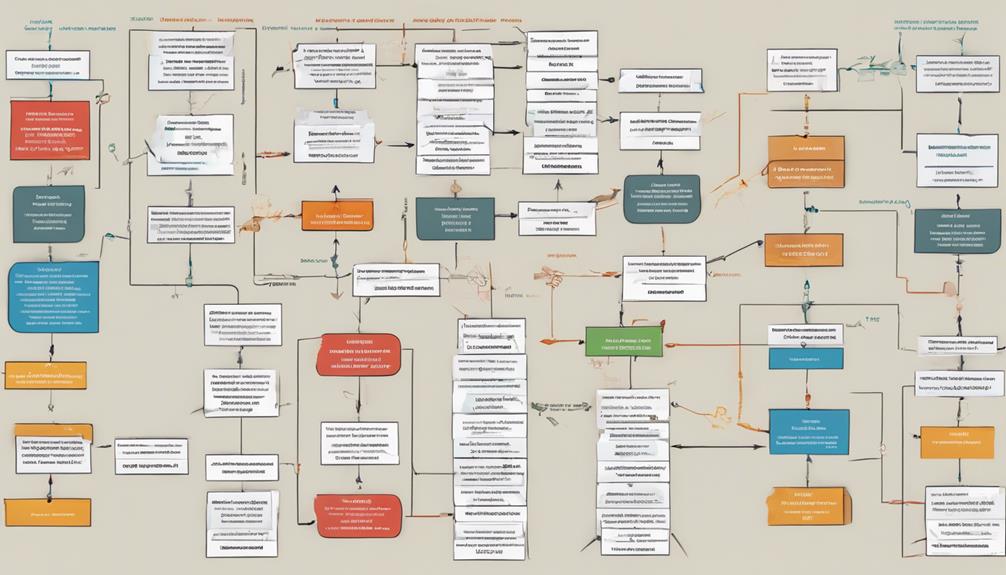
Factors determining restricted cases in the DuPage County Circuit Court include the nature of the information involved and the legal requirements for safeguarding confidentiality. Certain types of cases, such as sealed, expunged, or impounded cases, are automatically considered restricted. Cases involving juvenile defendants as the first named party are also commonly restricted from public access. Additionally, inactive cases and those restricted for legal reasons fall under this category. Unauthorized attempts to access such cases can result in legal consequences and potential prosecution. Access to restricted cases is strictly limited to authorized personnel, including attorneys, law enforcement officials, and other approved individuals.
| Factors | Examples |
|---|---|
| Nature of Information | Sealed, expunged, impounded cases |
| Legal Requirements | Cases involving juvenile defendants, inactive cases |
Consequences of Restricted Cases
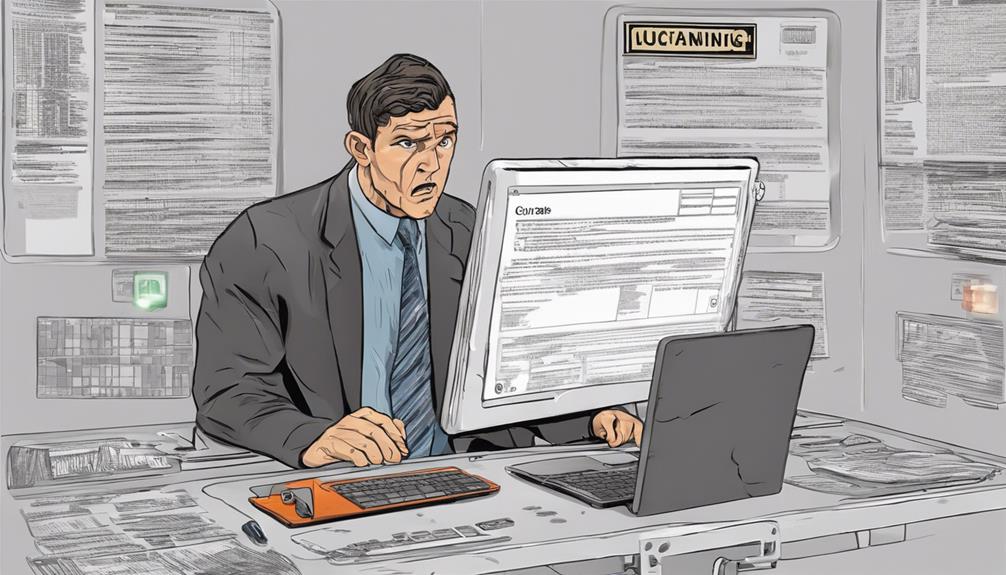
Restricted cases in the DuPage County Circuit Court can lead to severe consequences for those who attempt unauthorized access. These cases often involve sensitive information or ongoing investigations, warranting restricted access to authorized personnel only.
Individuals trying to breach this restriction may face legal repercussions due to the confidentiality and privacy concerns surrounding these cases. The restricted cases may encompass high-profile or confidential matters that necessitate special handling to safeguard the integrity of the legal process and the individuals involved.
Modifications in Restricted Cases
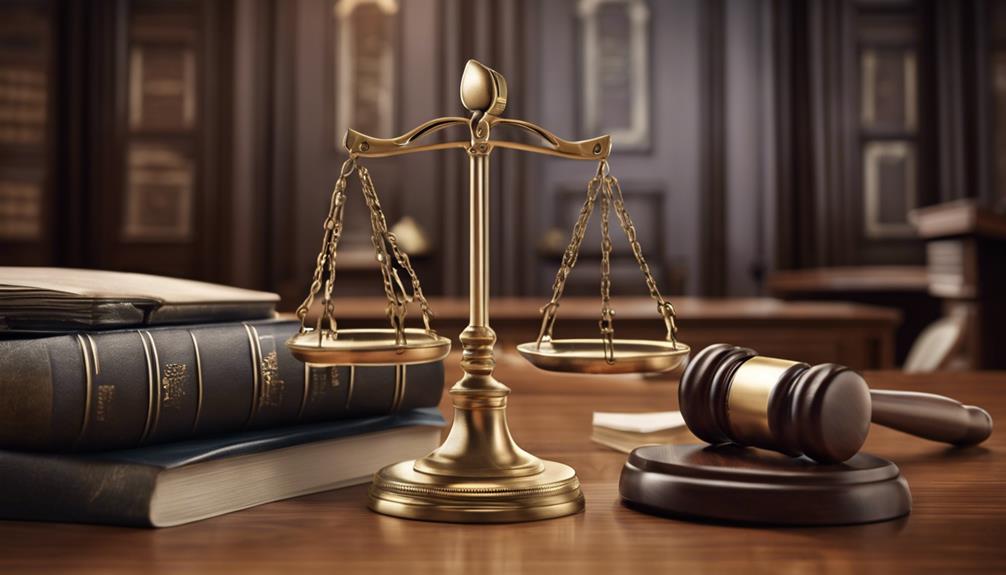
Modifications in restricted cases can be authorized under specific conditions, subject to court approval and supported by valid justifications and legal arguments. These modifications may be considered when there are changing circumstances or new evidence that warrant a review of the restrictions imposed. Court approval is typically necessary for any modifications in restricted cases to guarantee that the process follows the appropriate legal procedures.
When seeking a modification, it's important to provide valid reasons and legal arguments to support the request. This often involves filing a motion with the court outlining the proposed changes and the rationale behind them. It's advisable to seek legal representation when pursuing modifications in restricted cases to navigate the legal complexities effectively and make certain that all necessary steps are taken in accordance with the law. Having knowledgeable legal support can increase the chances of a successful modification outcome.
Seeking Legal Help for Restricted Cases
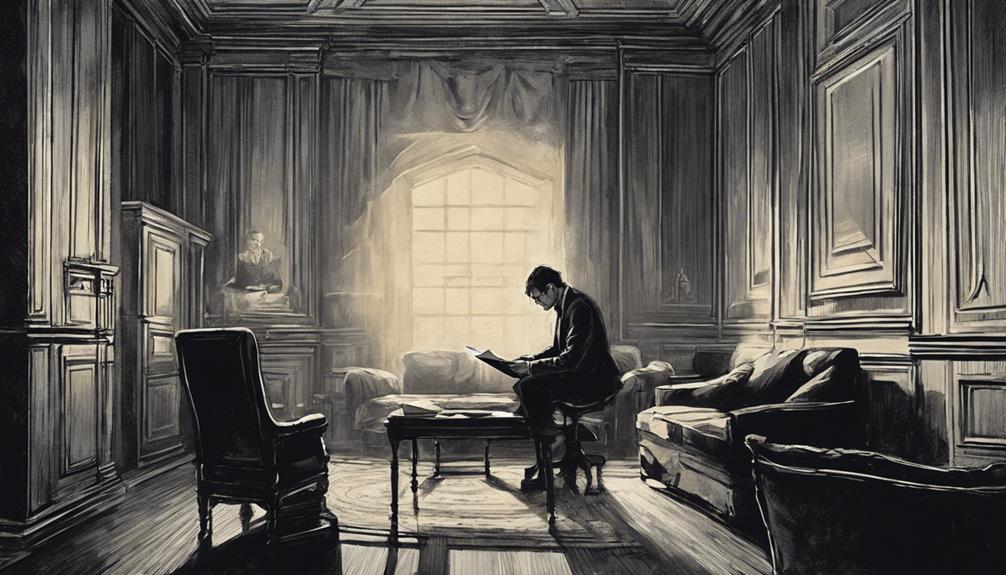
Legal support is essential for individuals managing cases with limited information in DuPage County. Access to restricted cases requires authorization from the 18th Judicial Circuit Clerks office, usually granted within two business days. Attorneys, law enforcement, and self-represented litigants must request access, with reactivated accounts needing new user IDs for entry. Experienced family law attorneys can offer valuable assistance in guiding and litigating cases with restricted details.
Unauthorized attempts to view restricted cases may result in prosecution, emphasizing the importance of obtaining proper authorization. Seeking legal help is vital for understanding the complexities of restricted cases and ensuring compliance with DuPage County's regulations. By enlisting the expertise of knowledgeable legal professionals, individuals can effectively manage their cases and pursue favorable outcomes within the bounds of the law.
Frequently Asked Questions
Are Cell Phones Allowed in Dupage County Courthouse?
Cell phones are allowed in the DuPage County Courthouse, but they must be turned off in courtrooms. Photography and recording are not permitted without prior authorization. It is advised to check the specific rules before visiting.
How Much Does It Cost to File in Small Claims Court in Dupage County?
Filing a small claims case in DuPage County costs $182 for claims up to $10,000 and $282 for claims between $10,001 and $25,000. Additional fees for service of process may apply. Fees are non-refundable.
What Is the Dupage County Pro Se?
The DuPage County Pro Se program empowers individuals to represent themselves in court. It offers resources, assistance, and workshops to navigate the legal system. One interesting statistic reveals a 20% increase in self-represented litigants utilizing the program last year.
How to File for a Divorce in Dupage County?
To file for a divorce in DuPage County, one must meet residency requirements, fill out a Petition for Dissolution of Marriage, serve their spouse, and attend court hearings. Consulting with a divorce attorney can help navigate the process.
Conclusion
To sum up, maneuvering through Dupage's limited cases can be a challenging ordeal.
Keep in mind, restricted cases are like a puzzle book with all the twists and turns, but regrettably, you can't skip to the final chapter.
Seek legal guidance to unravel the complexities and avoid getting lost in the legal maze.
Stay informed, stay cautious, and remember, the law waits for no one.
Good luck, detective!
Maya brings a wealth of experience in providing emotional support to individuals facing life’s challenges. Her contributions to How Get Divorce are characterized by empathy, understanding, and a profound sense of authority on matters of emotional well-being. Maya’s work is dedicated to ensuring that our community feels supported and understood, offering tools and advice to cope with the emotional aspects of divorce.
Divorce Guidance
Significance of an MSA in Divorce Proceedings
Gain control of your divorce process and secure your financial future by understanding the significance of an MSA – the key to a smoother and more efficient resolution.
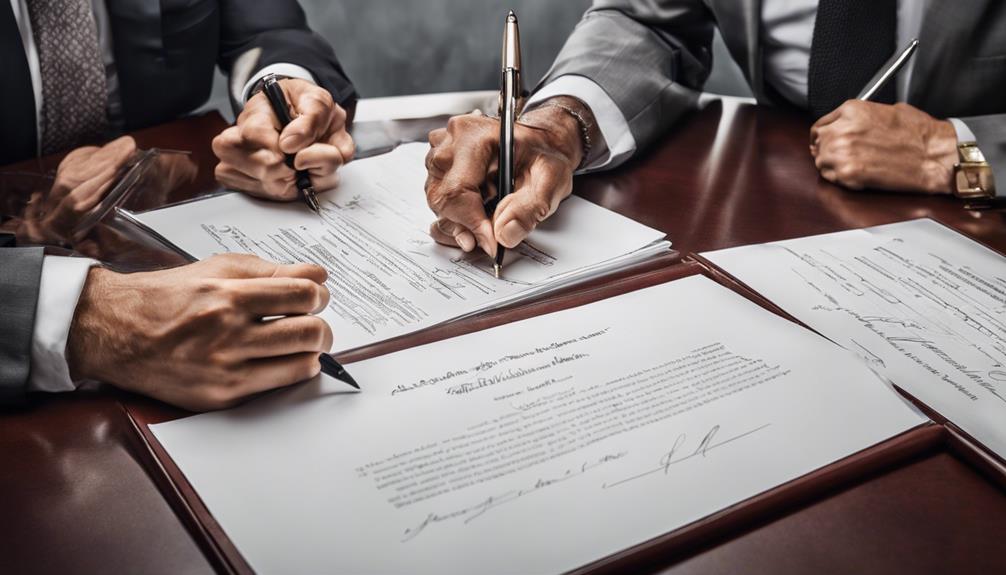
In divorce proceedings, the Marital Settlement Agreement (MSA) is vital. It allows parties to structure asset division, maintain privacy, facilitate communication, save costs, and resolve issues efficiently. This streamlines the divorce process and paves the way for post-divorce cooperation. The MSA empowers individuals to decide on asset fate, customize agreements, negotiate terms without court interference, and secure financial futures aligned with their best interests. By prioritizing MSA, parties benefit from a smoother and quicker resolution, emphasizing the significance of this approach in divorce proceedings. More insights on the benefits lie ahead.
Key Takeaways
- Greater control over asset division decisions
- Privacy and confidentiality protection
- Enhanced communication for smoother resolutions
- Cost-effective alternative to court proceedings
- Expedited divorce process with timely resolutions
Benefits of Using MSA in Divorce
When considering divorce proceedings, utilizing a Marital Settlement Agreement (MSA) offers significant benefits to both parties involved. MSAs provide greater control over the division of marital property, assets, and debts. This control allows the parties to tailor the agreement to their specific needs and priorities, ensuring a more personalized outcome. Additionally, MSAs offer privacy in handling sensitive issues like marital misconduct and finances. By keeping these matters out of the public court record, both parties can maintain confidentiality and protect their privacy.
Moreover, utilizing an MSA eliminates delays typically associated with court proceedings. This streamlined process not only saves time but also reduces the emotional strain often experienced during lengthy court battles. Additionally, MSAs result in a reduction in legal fees and court costs. By avoiding prolonged litigation, both parties can save money and allocate resources more efficiently.
In addition, MSAs promote post-divorce communication and compromise, especially for co-parenting situations. By establishing clear guidelines and expectations in the agreement, parties can foster a cooperative co-parenting relationship, ensuring the well-being of any children involved.
Control Over Asset Division
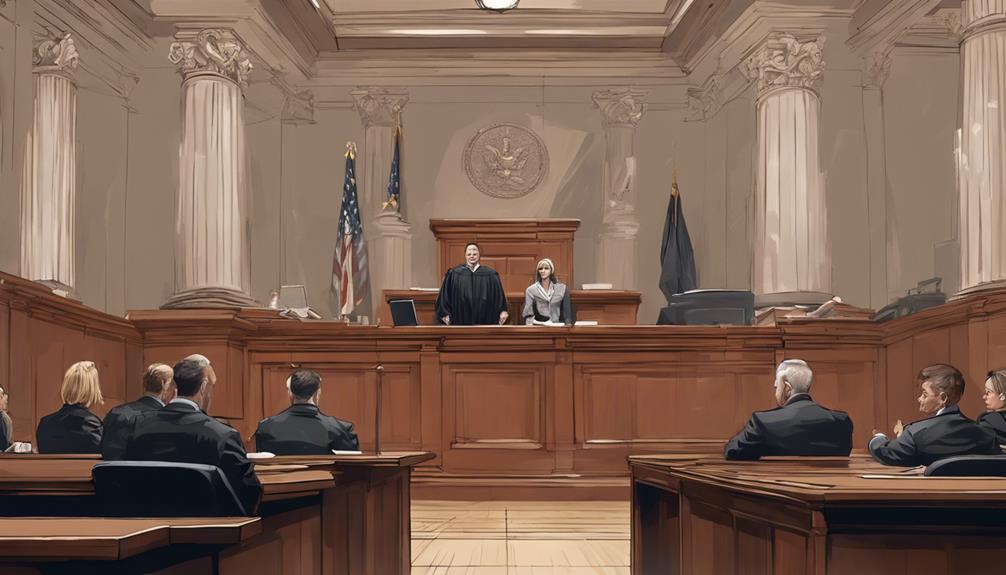
Moving from the benefits of using an MSA in divorce proceedings, control over asset division is a pivotal aspect that empowers parties to determine the fate of their marital assets, properties, and debts. An MSA provides individuals with the flexibility to customize how their assets will be divided based on their unique needs and priorities.
By negotiating and agreeing upon the terms of asset division without court intervention, parties can achieve a more personalized and satisfactory outcome. This control fosters a sense of empowerment and autonomy throughout the divorce process.
Additionally, utilizing an MSA helps parties avoid potential conflicts and uncertainties that may arise when asset division decisions are left to the discretion of the court. Ultimately, having control over asset division through an MSA allows parties to take charge of their financial future and make decisions that align with their best interests.
Privacy and Confidentiality Benefits

Maintaining privacy and confidentiality is a pivotal advantage of utilizing MSAs in divorce proceedings, safeguarding personal information within the agreement.
By keeping personal matters confidential and avoiding public court hearings for sensitive issues, MSAs provide a secure environment for discussing marital details. The limited involvement of third parties further guarantees privacy, protecting sensitive information from unnecessary exposure.
This focus on confidentiality is a key benefit of using an MSA, as it allows parties to resolve issues in a private setting, away from the scrutiny of the public eye. The confidentiality offered by MSAs not only shields personal information but also fosters a sense of security and trust between the parties involved.
Facilitation of Efficient Communication
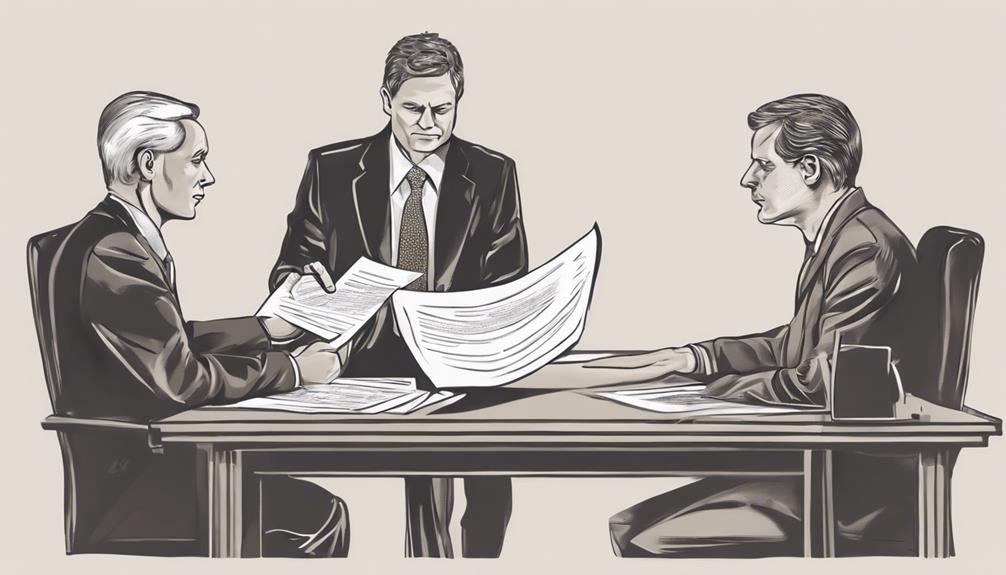
MSAs play an essential role in promoting efficient communication during divorce proceedings. By clearly defining terms and responsibilities, they help parties express their needs and concerns effectively.
This structured approach reduces misunderstandings and paves the way for smoother resolutions.
Clear Communication Channels
Establishing clear communication channels within a Marital Settlement Agreement (MSA) is essential for fostering efficient dialogue and facilitating successful negotiations between parties in divorce proceedings. Efficient communication through an MSA helps in reaching mutually beneficial agreements on important issues like child custody and asset division. Open lines of communication reduce misunderstandings and conflicts during the divorce process. Clarity in communication guarantees that both parties understand their rights and responsibilities post-divorce. Studies indicate that clear communication channels in MSAs lead to higher satisfaction levels and smoother post-divorce relationships.
| Benefits of Clear Communication Channels in MSA | |
|---|---|
| Facilitates effective negotiation | Reduces misunderstandings and conflicts |
| Helps in reaching mutually beneficial agreements | Guarantees understanding of rights and responsibilities |
| Leads to higher satisfaction levels | Promotes smoother post-divorce relationships |
Resolution Through Agreement
Efficient communication facilitated by Marital Settlement Agreements (MSAs) paves the way for resolving disputes through mutual agreement rather than court battles in divorce proceedings. By utilizing MSAs, parties can engage in constructive dialogue, leading to quicker and smoother resolutions.
Tailoring specific terms through effective communication within an MSA allows for personalized agreements that meet individual needs. This collaborative approach not only expedites the divorce process but also fosters improved post-divorce relationships.
Ultimately, the emphasis on resolution through agreement highlights the importance of clear and open communication in managing the complexities of divorce proceedings, offering a more amicable and efficient alternative to traditional litigation.
Cost-Effective Resolution Process

By choosing a Marital Settlement Agreement (MSA), divorcing parties can greatly lessen the financial costs associated with legal fees and court proceedings. MSAs reduce the time spent in court, leading to significant cost savings compared to contested divorce proceedings.
The streamlined approach of an MSA offers a cost-effective alternative, minimizing the financial burden on both parties involved. This cost efficiency is a key benefit of using an MSA to resolve divorce matters.
Rather than incurring extensive legal fees and court costs through a protracted court battle, parties can opt for the more economical route of negotiating and finalizing an MSA. By choosing this route, couples can achieve a quicker and more cost-effective resolution to their divorce, allowing them to move forward with their lives without the heavy financial strain often associated with traditional divorce proceedings.
Promotion of Post-Divorce Cooperation

To facilitate effective post-divorce cooperation, the clear and agreed-upon terms outlined in the Marital Settlement Agreement (MSA) play a pivotal role in fostering improved communication and collaboration between former spouses. Studies indicate that couples with well-defined MSAs experience enhanced post-divorce interactions.
By detailing responsibilities, the MSA reduces conflicts and misunderstandings, nurturing a more amicable relationship. This clarity also establishes guidelines for future interactions, minimizing disagreements and promoting effective co-parenting.
The structured framework of the MSA encourages mutual respect and collaborative decision-making, benefiting both parties in the long run. Overall, a well-crafted MSA serves as a roadmap for post-divorce relations, creating a foundation for cooperation and communication.
Embracing the terms of the agreement can lead to smoother interactions, reduced conflicts, and a more harmonious post-divorce environment for all involved.
Expedited Divorce Proceedings
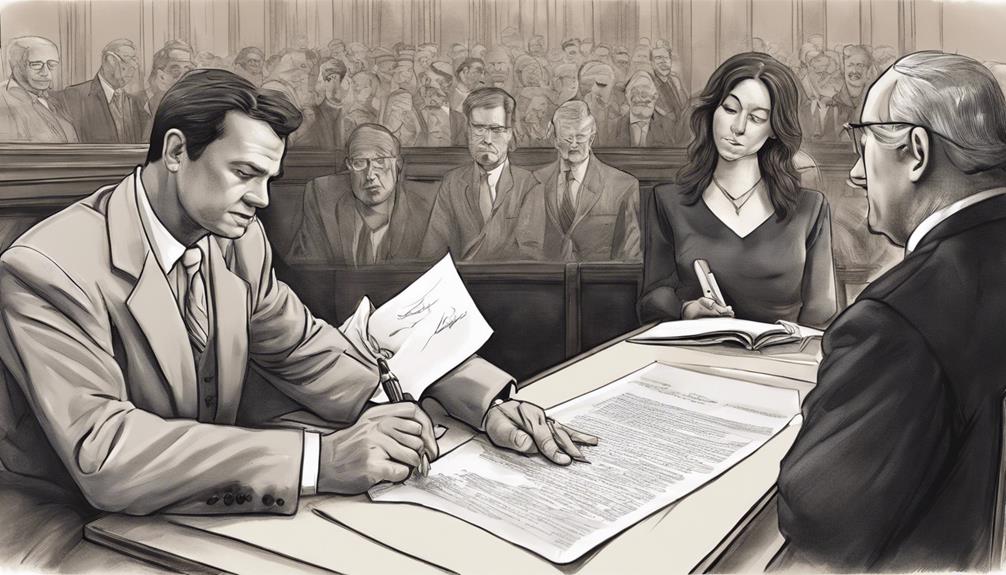
MSAs play an important role in expediting divorce proceedings by clearly outlining terms for asset division, child custody, and support. By establishing these terms upfront, couples can avoid lengthy court battles and streamline the process for a quicker resolution.
Utilizing an MSA helps parties finalize divorce terms efficiently, saving time and reducing the overall stress associated with divorce proceedings.
Speeding up Divorce
Expedited divorce proceedings facilitated by an MSA can greatly reduce the time spent on resolving marital disputes, sparing couples from prolonged court battles. By utilizing an MSA, couples can save months or even years that would have been consumed by lengthy legal processes.
These proceedings skip multiple court appearances and hearings, leading to a quicker resolution compared to contested divorces. Statistics indicate that divorces finalized through an MSA are typically concluded much faster. This swift finalization not only saves time but also reduces stress and emotional strain on both parties.
Courts prioritize cases with MSAs, resulting in faster processing and resolution of divorce matters. Overall, expedited divorce proceedings with an MSA offer a more efficient and less burdensome way to end a marriage.
Quick Resolution Benefits
Efficient divorce proceedings, facilitated by an MSA, offer a swift and less burdensome way to resolve marital disputes, saving couples valuable time and reducing emotional strain. By avoiding lengthy court battles, expedited divorce proceedings through an MSA enable prompt finalization of divorce terms, bringing peace of mind to both parties.
MSAs focus on reaching agreements swiftly, streamlining the process and reducing stress associated with prolonged legal procedures. The significance of quick resolution in divorce proceedings is underscored by the efficient approach of an MSA.
Couples benefit from the expedited nature of these proceedings, allowing them to move forward with their lives in a timely manner while minimizing the emotional toll often associated with divorce.
Frequently Asked Questions
What Is the Meaning of Marital Settlement?
A marital settlement is a written agreement between divorcing parties, outlining terms like asset division, child custody, support, spousal maintenance, property division, and debts. It's an essential document ensuring a fair resolution.
What Is a Marital Settlement Agreement California?
In California, a Marital Settlement Agreement (MSA) is a legal document that outlines the terms of a divorce settlement, covering asset division, child custody, support, and spousal maintenance. It must comply with state laws and court requirements.
Conclusion
To sum up, the MSA in divorce proceedings acts as a guiding light, leading couples through the stormy seas of asset division with control, privacy, and cost-effectiveness.
Like a compass pointing towards resolution, it paves the way for efficient communication and post-divorce cooperation.
With its ability to expedite proceedings and promote harmony, the MSA stands as a beacon of hope amidst the turmoil of divorce.
Maya brings a wealth of experience in providing emotional support to individuals facing life’s challenges. Her contributions to How Get Divorce are characterized by empathy, understanding, and a profound sense of authority on matters of emotional well-being. Maya’s work is dedicated to ensuring that our community feels supported and understood, offering tools and advice to cope with the emotional aspects of divorce.
Divorce Guidance
Successful Co-Parenting After Divorce: 10 Essential Tips
Craft a harmonious co-parenting dynamic with children's well-being at the forefront, setting the stage for post-divorce success.

To succeed at co-parenting after divorce, prioritize children's well-being, communicate effectively, set clear expectations, establish boundaries, navigate legal aspects, focus on self-care, and foster bonding experiences for a stable environment. Prioritize children's needs, base decisions on their welfare, and avoid personal conflicts. Use alternative communication, set clear rules, and share information effectively. Define custody and roles, create structured interactions, and maintain respectful boundaries. Understand legal agreements, seek advice, and comply with custody arrangements. Remember the importance of self-care, fun activities, involving kids in discussions, maintaining stability, and shielding them from conflicts. Discover further insights by exploring these essential tips.
Key Takeaways
- Prioritize children's well-being above personal conflicts.
- Establish clear communication strategies for effective co-parenting.
- Set boundaries and limits to maintain a healthy co-parenting dynamic.
- Navigate legal considerations like custody agreements and visitation schedules.
- Foster fun bonding experiences and involve children in discussions for a positive co-parenting environment.
Prioritize Childrens Well-Being
Prioritizing the well-being of children is paramount for successful co-parenting after divorce. When parents make their children the central focus, they create a foundation for healthy post-divorce dynamics. By keeping the children's needs at the forefront of decision-making, parents can cultivate a stable and secure environment that supports effective co-parenting.
Placing the interests of the children above personal grievances or conflicts is key to managing co-parenting successfully. When children see that their well-being is the top priority for both parents, it helps them adjust to the new family structure with more ease and confidence. This approach not only benefits the children but also sets a positive tone for the co-parenting relationship.
Ultimately, by prioritizing the well-being of their children, parents can lay the groundwork for a cooperative and supportive co-parenting dynamic that focuses on the best interests of the whole family.
Effective Communication Strategies

Effective communication plays an important role in reducing conflict between co-parents and promoting the well-being of children after divorce. To enhance communication effectiveness, utilizing alternative methods such as email or co-parenting apps can facilitate ongoing discussions. Clear communication is vital for establishing boundaries and setting expectations for co-parenting interactions. Implementing guidelines for respectful communication guarantees that important information is shared effectively, fostering a cooperative environment. Setting boundaries in communication helps maintain a respectful co-parenting relationship.
| Effective Communication Strategies | |
|---|---|
| Utilize alternative communication methods | Facilitate ongoing discussions |
| Clear communication | Establish boundaries and set expectations |
| Implement rules for respectful communication | Share important information effectively |
Establish Clear Expectations

To guarantee successful co-parenting after divorce, clearly setting expectations is vital in maintaining a harmonious relationship and promoting the well-being of the children.
Start by outlining custody arrangements and visitation schedules to avoid confusion between co-parents. Setting expectations for communication is paramount, including how often and through which methods you'll stay in touch.
Define specific roles and responsibilities for each parent to prevent misunderstandings and conflicts. Establish guidelines for making decisions about the children's well-being, ensuring both parents are on the same page.
Creating a structured framework for co-parenting interactions helps maintain order and clarity in your co-parenting relationship. By setting clear expectations early on, you can build a solid foundation for effective co-parenting that prioritizes the needs and stability of your children.
Set Boundaries and Limits

Establishing clear boundaries is essential in co-parenting relationships as they help define roles and expectations. Setting limits on communication can prevent conflicts and maintain a healthy dynamic between parents.
Boundaries guarantee respect for personal space and individual decisions, fostering effective co-parenting collaboration.
Clear Communication Guidelines
Establishing clear communication guidelines is essential for nurturing a harmonious co-parenting relationship after divorce. Setting boundaries and limits in communication helps maintain a respectful co-parenting dynamic. Effective communication boundaries can prevent unnecessary arguments and tension. Clear guidelines for communication can create a positive and cooperative co-parenting environment. Having defined limits in communication fosters a healthy relationship between co-parents.
- Reduce misunderstandings and conflicts.
- Maintain a respectful co-parenting dynamic.
- Prevent unnecessary arguments and tension.
- Create a positive and cooperative co-parenting environment.
- Foster a healthy relationship between co-parents.
Establish Rules Together
Collaborating with the co-parent to set clear rules and boundaries for consistent parenting is key in maintaining structure and discipline for children post-divorce.
Jointly deciding on rules promotes a united front and reduces confusion for children. Shared boundaries create a sense of stability and security in both households. By establishing limits together, both parents contribute to a harmonious co-parenting environment.
Consistency in these limits is essential for children's well-being. Setting boundaries also helps children understand expectations and fosters respect for authority. When rules are clearly defined and mutually agreed upon, it creates a smoother shift for children between households.
Ultimately, working together to establish and enforce rules can lead to a more positive co-parenting dynamic.
Consistent Enforcement Strategy
Maintaining consistent boundaries and limits is crucial for creating a stable environment for children post-divorce. Setting clear boundaries guarantees that both parents are on the same page regarding rules and expectations. Enforcing limits consistently provides children with a sense of security and predictability during a challenging time. Establishing boundaries helps prevent confusion and conflicts between co-parents regarding discipline and guidelines. Consistent enforcement strategies create a cohesive co-parenting approach that benefits children's well-being and development.
- Setting clear boundaries guarantees parental alignment on rules.
- Consistent enforcement offers predictability and security for kids.
- Establishing limits prevents conflicts and confusion.
- It fosters a cohesive co-parenting strategy.
- Benefits children's development and well-being.
Navigate Legal Considerations

Understanding legal agreements like custody and visitation arrangements is essential for successful co-parenting after a divorce. Seeking legal advice can help navigate intricate family law matters effectively.
Adhering to these agreements promotes stability for the children involved.
Legal Agreements Overview
Legal agreements in co-parenting serve as important documents that outline custody arrangements and visitation schedules for divorced parents. Understanding legal rights and responsibilities is crucial for informed decision-making in co-parenting. Adhering to custody agreements promotes stability and consistency for children after divorce. Setting boundaries with the ex-partner through legal agreements helps establish clear expectations in co-parenting. Seeking legal advice can provide guidance on navigating complex family law matters related to co-parenting.
- Legal agreements outline custody arrangements and visitation schedules.
- Understanding rights and responsibilities is crucial.
- Adhering to agreements promotes stability for children.
- Setting boundaries with the ex-partner establishes clear expectations.
- Seeking legal advice aids in navigating complex family law matters.
Custody and Visitation Arrangements
Managing custody and visitation arrangements post-divorce requires careful consideration of the child's living situation and decision-making responsibilities. Custody arrangements dictate where the child resides and who holds authority over important decisions. Meanwhile, visitation schedules delineate when the non-custodial parent can spend time with the child.
These legal agreements serve to provide structure and clarity for co-parents, fostering stability and consistency for the child. Adhering to these arrangements is essential for ensuring a harmonious co-parenting relationship and promoting the well-being of the child.
Understanding the intricacies of custody and visitation arrangements is crucial for maneuvering the legal landscape after divorce and establishing a supportive environment for the child's upbringing.
Practice Self-Care for Parents

Engaging in self-care practices is crucial for parents post-divorce to uphold their well-being and effectively support their children. Prioritizing self-care not only benefits the parents but also positively impacts the entire family dynamic.
Here are some key self-care practices for parents to ponder:
- Stress-Reducing Activities: Engage in activities that help diminish stress levels, such as exercise, mindfulness, or hobbies.
- Seek Support: Don't hesitate to reach out to friends, family, or professionals for emotional support and guidance.
- Take Breaks: Recognize when you need a breather to prevent burnout and enhance resilience in co-parenting situations.
- Healthy Work-Life Balance: Endeavor to maintain a healthy balance between work commitments and personal time to exemplify self-care for your children.
- Practice Self-Compassion: Be kind to yourself, acknowledge your efforts, and treat yourself with the same compassion you show others.
Foster Fun and Bonding Experiences

After prioritizing self-care to maintain their well-being, parents post-divorce should focus on fostering fun and bonding experiences with their children. Creating positive experiences through engaging in enjoyable activities can have a profound impact on the parent-child relationship. Day trips and outings provide opportunities to build lasting memories and strengthen bonds with children. Quality time spent together helps children adjust to new family dynamics, contributing to a sense of normalcy and stability post-divorce.
Prioritizing these fun and bonding experiences not only fosters a positive environment but also enhances the overall well-being of both parents and children. By making time for these activities, parents can create a space for open communication, laughter, and shared experiences that can help navigate the challenges of co-parenting after divorce effectively. Building these connections through fun and bonding moments is a critical step in ensuring a healthy and supportive environment for children during this transformative period.
Involve Children in Discussions

Involving children in discussions is essential for making them feel valued and heard in decision-making. Encouraging open communication allows children to express their thoughts, fostering empowerment and responsibility.
Age-appropriate involvement can enhance their understanding of family dynamics and promote a smoother shift post-divorce.
Childs Input Matters
Children's involvement in co-parenting discussions is vital for fostering empowerment and inclusion within the family dynamic. When children have a say in decisions, they feel valued and respected, strengthening their bond with parents. Here are some key reasons why involving children in discussions is essential:
- Empowerment: Children feel empowered when their opinions are considered.
- Inclusion: Including children in discussions fosters a sense of belonging within the family unit.
- Insightful perspectives: Children's viewpoints can offer unique insights that aid co-parents in making informed choices.
- Relationship building: Discussing decisions with children can enhance the parent-child relationship and build trust.
- Respect: Acknowledging children's input demonstrates respect for their thoughts and feelings in the co-parenting dynamic.
Encourage Open Communication
Encouraging open communication with children in co-parenting discussions fosters a sense of inclusion and empowers them to develop problem-solving skills. Involving children in discussions about schedules and activities not only makes them feel heard and valued but also teaches them the importance of expressing their thoughts and feelings.
When children are included in decision-making processes, it enhances their sense of responsibility and independence within the family dynamic. This open dialogue about co-parenting arrangements also helps build trust and transparency, creating a healthier and more supportive environment for the children.
Maintain Stability and Routine

Establishing a stable routine after divorce is essential for the well-being of children. Consistent schedules provide a sense of security and predictability for children. This stability helps them adjust to the new family dynamic post-divorce. Maintaining routine and structure can aid children in coping with the changes resulting from the divorce. It fosters a sense of normalcy and comfort for children during the adaptation.
- Consistent schedules provide security and predictability.
- Stability helps children adjust to the new family dynamic.
- Routine and structure aid children in coping with divorce changes.
- Stability fosters a sense of normalcy during the adaptation.
- Predictability brings comfort and stability to children.
Shield Children From Conflicts

Minimizing children's exposure to parental conflicts is vital for safeguarding their emotional well-being. It's essential to reassure children that handling conflicts is the responsibility of the parents, not the children themselves.
By avoiding speaking negatively about the other parent in front of the children, a positive environment can be maintained. Emphasizing to children that they don't need to worry about the conflicts between their parents can help alleviate any unnecessary stress. Shielding children from the stressful parental feelings by keeping them out of the conflicts can create a more stable and secure environment for them.
Remember that children look to their parents for guidance and security, so it's important to handle conflicts in a way that shields them from unnecessary emotional turmoil. By prioritizing the well-being of the children and minimizing their exposure to conflicts, parents can create a healthier co-parenting dynamic that focuses on the children's needs above all else.
Frequently Asked Questions
What Makes for Successful Co-Parenting After a Divorce?
Effective co-parenting post-divorce thrives on prioritizing children, fostering open communication, and embracing flexibility. It requires setting clear expectations, maintaining consistency, and putting kids' needs first. Success lies in cooperation, respect, and a child-centered approach.
What Is Best for a Child of Divorced Parents?
For a child of divorced parents, what's best is prioritizing their well-being. Open communication, cooperation, and consistency in parenting approaches provide stability. Age-appropriate discussions about divorce help children understand. Respecting boundaries and legal considerations promote a healthy environment.
What Is Healthy Co-Parenting After Divorce?
Healthy co-parenting after divorce involves prioritizing the children's well-being through effective communication, collaboration, and a positive dynamic. It aims to minimize conflict, maintain consistency, and create a stable, supportive environment for the children.
Are Kids OK After Divorce?
Children can thrive after divorce if co-parenting is successful. Research shows their well-being is influenced by the quality of the co-parenting relationship. When parents prioritize their needs, kids can adapt well and maintain stability post-divorce.
Conclusion
To sum up, successful co-parenting after divorce requires prioritizing children's well-being, effective communication, clear expectations, boundaries, and legal considerations.
By fostering bonding experiences, involving children in discussions, maintaining stability, and shielding them from conflicts, parents can create a positive environment for their children to thrive.
It's essential to put aside personal differences and focus on the best interests of the children to guarantee a smooth shift and healthy relationships post-divorce.
Maya brings a wealth of experience in providing emotional support to individuals facing life’s challenges. Her contributions to How Get Divorce are characterized by empathy, understanding, and a profound sense of authority on matters of emotional well-being. Maya’s work is dedicated to ensuring that our community feels supported and understood, offering tools and advice to cope with the emotional aspects of divorce.
-

 Navigating the Divorce Process2 months ago
Navigating the Divorce Process2 months agoNavigating the Complexity: Divorce Document Preparation Services Explained
-

 Financial Aspects2 months ago
Financial Aspects2 months agoFinancial Advisor's Guide to Navigating Divorce Finances
-

 Navigating the Divorce Process2 months ago
Navigating the Divorce Process2 months agoDivorce Lawyers New Orleans: Your Ultimate Guide to Legal Separation and Family Law
-

 Navigating the Divorce Process2 months ago
Navigating the Divorce Process2 months agoNavigating Divorce with a Muslim Divorce Lawyer
-

 Supporting Children Through Divorce2 months ago
Supporting Children Through Divorce2 months agoPositive Effects of Divorce on Children: A Guide to Understanding
-

 Life After Divorce2 months ago
Life After Divorce2 months agoTD Jakes: Life After Divorce – A Journey of Healing
-

 Directory2 months ago
Directory2 months agoCompassionate Vista Divorce Attorney | Family Law Help
-

 Navigating the Divorce Process2 months ago
Navigating the Divorce Process2 months agoUnderstanding Dominican Republic Divorce Law







































